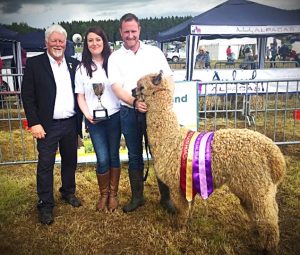Alpacas are random pets, we know this. We love this. Have a nosey below at some for some information on these random fluffy lawnmowers.
WHAT ARE ALPACAS
Alpacas belong to the camelid family. They originate on the high grounds of Peru, Chili & Bolivia but are now kept all around the world.
There are two types – Huacaya have fine dense fleece and Suri’s fleece hangs in long ringlets.
Adults weigh 60-80kg and come in 22 colours.
Alpacas live for 15-25 years.
WHAT ARE ALPACAS USED FOR
Pets, breeding, fiber producers, trekking and/or therapy animals.
WHAT DOES AN ALPACA EAT
Alpacas need access to clean water and ad lib hay/haylage all year round. Additionally we recommend they are fed a cup of meal daily, this is especially important in the Winter when grass is not abundant. We recommend GWF Camelibra Alpaca Feed which has the right levels of vitamins, minerals and trace elements required for a healthy alpaca. If an animal needs extra fibre add some GWF Fibregest pellets to their meal. This may be necessary if underweight or for a nursing pregnant mother. We are stockists of Camelibra and Fibregest; Shop here
ARE ALPACAS HERD ANIMALS
Alpacas are naturally herd animals and only really feel safe with their own kind.
Also it is recommended alpacas are kept in SAME SEX herds, two minimum although three or more is preferable. If both sexes are kept they need to be kept apart.
They can co-graze with other species but need fed separately. As they have a lower threshold for parasite burdens than other domestic animals so they need monitored if grazed with non-alpacas.
BREEDING ALPACAS
They are pregnant for 11.5 months and generally only have one CRIA.
They usually birth during the day around 10am-2pm.
Cria are weaned around 6 months of age.
Alpacas are induced ovulaters and ‘spit offs’ or scans used to confirm pregnancy.
As alpaca males and females can’t be kept together breeders either keep males and females but separately or get covers for their females. We offer on farm and mobile mating’s with our studs.
DO ALPACAS NEED SHEARED?
Huacaya alpacas need to be sheared annually to ensure no heat stress during summer, suri alpacas are sometimes sheared every other year. We run a shearing day in early Summer where everyone is welcome to come to us to get their animals sheared. This is usually more cost effective as the shearers have a minimum cost per venue. For a small fee we can also organise annual vaccinations, worming, vitamins, toenail trimming and teeth checks etc. Our shearing days run early April every year – volunteers welcome! Please contact us if you would like to join in on these days.
SHELTER & STOCKING
Stocking rate of alpacas is 5-10 per acre depending on the grass and if you are planning on poo picking (yes it is a thing, check out poovers).
Fencing – alpacas generally do not challenge fencing and can be kept in with 4ft sheep wire with no barbed wire. Although if boys and girls are adjacent we would recommend a strong divide.
Alpacas can live outside all year round but they do need a shed to protect from hot or cold weather.
WHAT MEDICATIONS DO ALPACAS NEED?
Annual Vaccinations; Heptivac-‘P’ Plus or Bravoxin 10. – this is a combined 7 in 1 or 10 in 1 Clostridial plus Pasteurella vaccine. This subcutaneous injection is required annually at 2ml for adults and cria alike. Cria are given their first dose at 30 days and another booster at 60 days then annually after that.
Wormer – We recommend faecal testing that can be done instead of routinely worming as immunity can develop. We provide this service if required.
Flukiver – for the control and prevention of liver fluke. Oral drench given every 6-8 weeks from September-March (when wet). Not required during dry months.
Vitamin A, D & E – this is for the prevention of rickets and other vitamin deficiency related conditions and administered through either intermuscular injection (Bioveta – ordered through your vets) or oral Premier A,D3&E Paste+ supplied by ourselves. The paste needs to be administered every month from September to March (inclusively).
This is what we do and suggest you modify it to suit your own individual farm and circumstances. Develop your husbandry in conjunction with your local vet or by consultation with consultant vet with camelid specific expertise.
ALPACA SHOWS
The Northern Ireland Alpaca Group holds the Northern Ireland Alpaca Championships annually. Follow their website or facebook page to see information on show dates.


